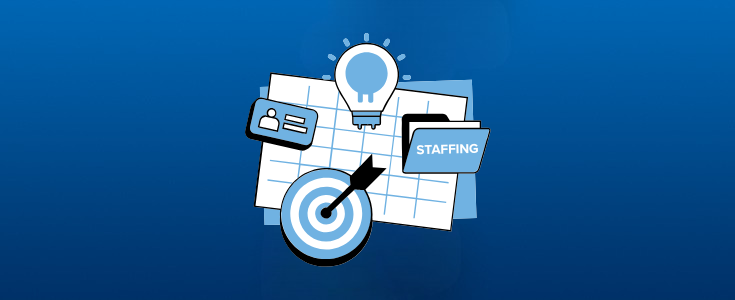The Human Element: AI-Generated Resumes

Denying the impact, influence, and importance of artificial intelligence is futile — it’s here, and every last one of us must adapt. The question becomes: How can we harness AI’s potential to enhance our life, not complicate it? That’s a puzzle many are wrestling with. Take the labor market, where job seekers and employers have their own answers — and they often are at odds.
For prospective employees, AI-generated resumes have fundamentally changed how to apply for a job. For employers, AI-generated resumes pose a challenge in identifying genuine candidates who possess the right skills for a job opening: Anybody can use AI to create a resume that seems to check all the boxes. That challenge has, ironically, underscored the importance of human oversight in hiring. Employers are increasingly pairing AI with their HR and talent acquisition teams to identify candidates who are truly qualified for the job. At Medix, we employ a human-led, tech-enabled process to find ideal candidates for our clients.
The Shifting Landscape: The Rise of AI-Generated Resumes
How common are AI-generated resumes nowadays? Career Group Companies asked job candidates that question: 62%1 said they’re using AI to write resumes, cover letters, or writing samples. It was just 32% six months earlier in the same survey. What’s behind the jump? Simple: Increased access and productivity.
Generative AI chatbots like ChatGPT and Google Gemini plus AI-driven resume-writing apps make it possible for job seekers to create resumes in seconds tailored to specific job opportunities. The result is a tsunami of applications every time a job opening appears online. LinkedIn saw a 45%2 increase in applications submitted through its platform in the past year for an average of over 11,000 applications each minute. All these AI-generated resumes pose many problems for HR departments.
- Masking credentials: AI resumes sound professional and include all the essential information employers want to see, but in many cases it’s just a facade that hides lack of qualifications — or embellishes them — and obscures red flags like inexperience, missing skills, or gaps in experience. Recruiters could devote time to these candidates who aren’t a real fit for the job.
- Oversaturation: The skyrocketing volume of applications makes it difficult for recruiters to identify top candidates. This, in turn, slows the hiring process to a crawl, prolonging openings and consuming precious resources. It’s a recipe for recruiter burnout, which only exacerbates the challenge of hiring in the AI age.
- Perpetuating biases: With candidates creating resumes using the same AI services trained on the same data, which could contain biases, there’s a real risk that AI screening tools may favor applicants with similar backgrounds, experiences, and characteristics. Candidates with unique experiences or from different backgrounds could be overlooked. It’s up to the humans on the hiring team to stop this from happening.
The Human Element: Why It Matters More Than Ever
Amid this proliferation of AI on both sides of the recruiting process, the importance of human oversight cannot be overstated. After all, it’s the hiring managers and recruiters who are intimately familiar with an organization’s needs and culture. They are the ones who will get a “gut feeling” about an applicant and will truly judge their character.
As candidates progress through the hiring process, human interactions and decision-making take on more urgency to filter out unqualified applicants. A hybrid approach, with AI doing initial screening and recruiters handling in-depth interviews and skills assessments, gives hiring teams the opportunity to focus on the human element:
- Relationship-building: A resume — even an AI-generated resume — tells you what a candidate has done (supposedly), but a conversation can tell you who they are and how they interact with other professionals. Building rapport and engaging in meaningful dialogue enables you to assess a candidate’s character, communication style, and cultural fit.
- Behavioral insight: A piece of paper or PDF won’t give you the full picture of a candidate. Human recruiters and hiring managers can read between the AI-generated lines. They can ask follow-up questions to elicit specific, tangible examples of past work rather than just accepting a resume packed with keywords.’
- Emotional intelligence: AI cannot replicate a human’s emotional intelligence. This gives recruiters an edge when it comes to gauging a candidate’s fit for a company’s culture, their passion for their profession, or their ability to work with others — determining if they have “it.”
A Practical Guide for Hiring Managers
You know you’re receiving scores of AI-generated resumes, but how can you know for sure as you’re perusing them? AI text gives itself away with tells that have become predictable over time. Here are a few ways to pinpoint an AI resume.
Generic language and cliched phrases: Generative AI chatbots are trained on existing language datasets, including human writing. So, while they can produce human-quality text, they tend to sound overly professional and polished, stilted even, relying on well-worn language — a greatest hits of all the phrases it has evaluated in its data. It will produce something vague like “results-driven professional with a proven track record of success” instead of “increased sales 20% in the first quarter of 2025 as a junior account executive.”
Checking all the skills boxes for a job: Congratulations, this candidate’s resume includes every last skill listed in the job description — in the same order even. That’s quite a coincidence, right? No, that’s AI learning. A comprehensive set of skills without examples of how those skills were applied in the real-world should be a red flag. If the candidate advances to an interview, this is where you follow up to task for more details.
Lack of personalization: This should come as no surprise, but AI resumes often don’t include the personal touch or storytelling that only a human can convey. Instead, AI will stick with the keywords in the job listing and the skills required for successful candidates. If you find yourself asking, “Where’s the personality?” you might be reading an AI-generated resume.
Unable to answer probing interview questions: Challenge the candidate; test the resume’s claims. Ask the application to walk you through a scenario in which they used the skills on their resume. What were the metrics? What was the outcome? A genuine candidate will have a detailed story to tell. If they don’t, well, that’s a revealing answer too.
Hiring teams unable to separate AI-generated resumes from the real deal run the risk of hiring someone who looks great on paper but lacks the foundational experience, problem-solving skills, or cultural match to truly succeed. In the long run, you’ll experience a decline in the quality of hires, a lack of diversity in your teams, and an increase in turnover when you discover the disconnect between resumes and actual abilities.
The Medix Differentiator: Your Partner in Vetting
In the age of AI recruiting, a staffing partner that takes a human-first, tech-enabled approach to recruiting is a vital asset. Medix fits the bill. Our experienced team provides a crucial human layer of vetting that technology cannot replicate. We use a proven, award-winning model that combines proprietary data-driven tools with our recruiters’ insight to help you make more confident hiring decisions.
Central to our model is an in-depth, comprehensive 5-step candidate vetting process that puts us face to face and ear to ear with applicants. This enables us to get to know them so we can ensure you get someone who is not only qualified on paper but also possesses the soft skills, values, and career goals that are in lock step with your company’s mission. We believe in investing the time to build relationships and understand your specific needs, then leverage our expertise to deliver what you need, when you need it.
Partner With Medix for Human-Led Staffing Solutions
AI is here to stay in recruiting. In fact, it will only continue to exert more influence and make bigger impacts on how all companies search for and evaluate candidates. The biggest challenge ahead is for HR and talent acquisition teams to remember that this technology is just a tool. It’s the people that do the real work of building teams, using the innate tools unique to humans: empathy, emotional intelligence, and insight.
By partnering with Medix, you’re getting so much more than access to a database of resumes. You’re gaining a partner with almost 25 years of experience who understands the importance of human connection and how candidates jell on a personal level with our clients. Make a confident choice with your next hire. Contact us today to get started.
Sources

Work with a Trusted Healthcare and Life Sciences Staffing Partner
Connect with Medix to get the expertise and resources you need to succeed.



